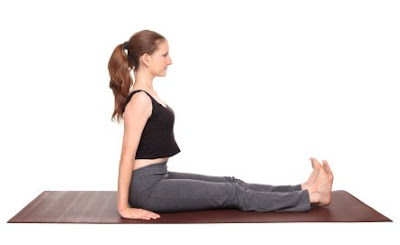In case you didn’t know, the sciatic nerve is the longest and widest nerve in human body. It starts close to the spine in the area where the lower back is located and goes all the way down to the back of each leg via our buttocks.
The pain associated with this nerve is one of the most intense and unpleasant pains you can witness. When this pain occurs people have problems standing straight and the situation gets worse when they decide to sit down.
Most of the symptoms appear on the right or left side of the lower back and affect the buttocks and legs and in many cases in the feet too.
There are some individuals who witness a burning sensation in one of the legs or buttocks while the rest of the areas feel numb. In most cases, the affected leg feels weak and cold.
Numb thighs and buttocks, weakness in one of the legs or lower back area, tingling and/or burning sensation in the feet and legs and having problems to manage bowel and bladder work are some other symptoms associated with sciatica pain.
In addition, there are some health issues that have impact of the state of sciatica nerve and often lead to pain. Some of these conditions include: spinal stenosis, spinal disorders like spondylitis, cracked or damaged disc, disc diseases and lower back trauma.
While it is true that some people have more problems with this condition than the other, it is also true that if we don’t treat this condition the situation will get worse over time.
When Does the Pain Occur?
Typically, the pain starts slowly and gradually and the symptoms are felt more at night or when people are coughing, sneezing or even when they are laughing. Additionally, they can feel pain when walking for a long time, standing or sitting for a long time and don’t bend forward or backward for a very long period of time.
In order to soothe sciatic nerve pain, you can rely on many pharmaceutical medications and conventional therapies. However, even experienced physicians advise people to perform some physical activity like stretching for example.
Yoga has Proven to be an Efficient Pain Relief Technique
Seven years ago, The Alternative Therapies in Health and medicine revealed a scientific study in which individuals experiencing moderate to intense back pain who practiced a combination of yoga and standard therapies (using medications) have witnessed a drastic ease in the frequency and intensity of sciatica pain. As a matter of fact, this relief was present more after yoga exercises.
NOTE: Consult with your doctor before performing any type of exercise.
Yoga Poses to Soothe Sciatic Nerve Pain
Staff Pose or Dandasana
This is actually a basic sitting position in yoga which will stretch and relax the legs, activate the lower back, improve blood flow in the problematic areas and bring positive effects to the sciatic nerve.
- Sit on a mat with your legs stretched right in front of your body and keep the hands at the sides. The palms should be pressed on the floor.
- Try to flex the feet forward and stretch the legs at the same time.
- Bring the back up and stretch the spine as much as you can.
- Remain in this position for up to 30 seconds and don’t forget to make deep breaths.
Relax for a few seconds and perform this exercise for ten times (you can perform 5 reps in the beginning).
Locust Pose or Shalabhasana
Thanks to this pose, you will support the lower back and boost blood flow to the hips. It turns out that sciatica pain can sometimes be triggered by improper blood flow. If the circulation is not good, you will experience pressure in different body parts that can result in sciatica pain. Enhanced blood circulation will encourage healing and support sciatica pain relief.
- Lie down on the ground with your face positioned to the ground. Put the arms at your sides and keep the palms outwards. The toes must be positioned downward and they must ouch each other. Keep the heels apart.
- Touch the ground with the chin; keep the neck elongated and the pubic bone pressed down.
- Inhale deeply and lift the legs, chest and arms up at once. Raise your knees off the floor, place your shoulders close to each other and keep the neck straight. When you feel that you have reached the highest position, breathe out and remain in this position for eight seconds. Try to stretch the back carefully.
- When you are in this position, breathe in and spread the legs away from each other, breathe in and bring them together. Perform this interesting exercise for five times. People use this pose to support the regular locust pose and it was proven that it can reduce sciatic pain.
- Carefully bring yourself to the initial position. Keep the hand under the forehead and take a rest for 60 seconds.
- Perform this exercise between five and ten times.
Supported Bridge Pose or Setu Bandhasana
Now here’s another exercise that is ideal for the buttock and great option for those dealing with sciatic pain.
- Lie on the ground on the back, gently bent the knees and put the feet on the floor.
- Bring back the heels towards the buttocks and put the arms and palms down parallel to the body.
- Apply some pressure on the ground with the help of the palms and feet as a form of support, inhale deeply and slowly raise the hips off the floor. At the same time push the tailbone up in the direction of the pubic bone. Keep the neck, shoulders and head on the ground while the lower back must be elongated and the knees must be placed apart.
- Remain in this position for about 15 seconds, breathe out and put your body down.
- Perform this exercise for up to ten times.
Pigeon Pose or Kapotasana
In some cases, sciatic pain comes as a result of certain pressure and irritation on this nerve that push this nerve against the tendons found right beneath this nerve.
- Rise up and stand relying on the knees and palms.
- Put the left knee forward so it can come right behind the left wrist and the left foot is positioned right in front of the right wrist. Keep the chin at a 45 degree angle at that moment.
- Carefully slide the right leg back and elongate the torso forward.
- Remain in this position for about five seconds, breathe in and stretch the hand in front of the body, placing the forehead to the floor in a sleeping pose.
- Inhale deeply and keep this position for half a minute. Don’t forget to push the right thigh in the direction of the floor and to push the stomach in for additional balance.
- Raise the head up, pull the hands back, tuck the right toes in and pull the left leg back.
- Perform this exercise for ten times and switch the legs after every repetition.
Lie Back Big Toe Pose or Supta Padangusthasana
If you want to ease sciatic pain then you must try this exercise. In addition, the Supta Padangusthasana supports blood flow in the affected areas.
- Lie on the ground on your flattened back and bend the left knee. Pull it toward the chest.
- Take an elastic strap and wrap it around the ball of the foot and raise your left leg up.
- Keep the flexed and open and at the same time stretch the leg while the buttocks are pressed against the floor.
- Inhale deeply and keep this position for about ten seconds.
- Slowly lower the left knee back in the direction of the chest before putting the left leg back on the floor.
- Perform this exercise with the right leg too. Switch the legs for about ten times.
Spinal Twisting Pose or Ardha Matsyendrasana
The last exercise is here to help you get rid of pain and tension in your back and boost blood circulation.
- First of all, sit directly on your mat, stretch the legs and place the arms and hands by the sides.
- Bend the left knee, put the left foot right outside the right thigh and grab the left toe with the right hand.
- Out the left hand behind the back and position the upper body to the left while inhaling deeply.
- Keep this position for one minute, bring back the legs to the initial position and do this exercise again.
By practicing this yoga exercises, you should be able to reduce sciatic pain in a short period of time.










